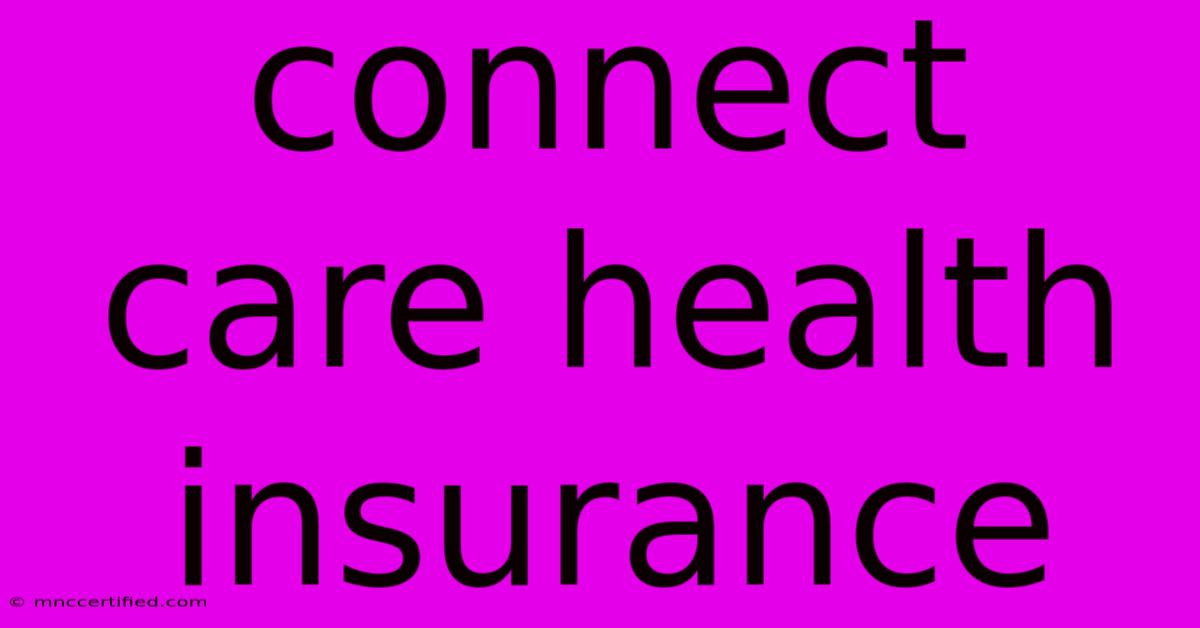Connect Care Health Insurance

Table of Contents
ConnectCare Health Insurance: A Comprehensive Guide
Choosing the right health insurance is crucial, and understanding your options is the first step. This comprehensive guide dives deep into ConnectCare health insurance, exploring its features, benefits, and drawbacks to help you determine if it's the right fit for your needs.
What is ConnectCare Health Insurance?
ConnectCare isn't a single, nationally recognized insurance provider like Blue Cross Blue Shield or UnitedHealthcare. Instead, "ConnectCare" is often used as a branded term by various insurance brokers or platforms to describe their services connecting individuals with different health insurance plans. This means the specifics of a "ConnectCare" plan will vary significantly depending on the broker offering it and the underlying insurance company providing the coverage.
Therefore, this article will focus on general considerations when evaluating health insurance plans often marketed under the "ConnectCare" label or similar names. It's crucial to get specific details directly from the broker or platform presenting the ConnectCare plan you're interested in.
Key Features to Look For in a ConnectCare-Type Plan
Regardless of the specific broker, several key features should be considered when reviewing any health insurance plan presented as a "ConnectCare" offering:
1. Network Coverage:
- In-Network vs. Out-of-Network Providers: Understand which doctors, hospitals, and specialists are included in the plan's network. Using in-network providers significantly reduces your out-of-pocket costs. Check if your preferred healthcare professionals are part of the network before enrolling.
- Geographic Coverage: Determine the plan's geographical coverage area. If you travel frequently or live in a specific region, ensure the plan covers your needs.
2. Plan Type:
- HMO (Health Maintenance Organization): Usually requires you to choose a primary care physician (PCP) who acts as a gatekeeper to specialists. Generally, the most affordable option.
- PPO (Preferred Provider Organization): Offers more flexibility; you can see specialists without a referral, but out-of-network costs are higher.
- EPO (Exclusive Provider Organization): Similar to an HMO but with slightly more flexibility.
- POS (Point of Service): Combines aspects of HMOs and PPOs.
3. Premium Costs:
- Monthly Premiums: How much will you pay monthly for the insurance coverage?
- Deductible: The amount you pay out-of-pocket before your insurance coverage kicks in.
- Copay: A fixed amount you pay for a doctor's visit or other services.
- Coinsurance: Your share of the costs after meeting your deductible.
- Out-of-Pocket Maximum: The most you'll pay out-of-pocket in a year.
4. Covered Services:
- Essential Health Benefits (EHB): The Affordable Care Act (ACA) mandates that most health insurance plans cover ten essential health benefits, including hospitalization, maternity care, and mental healthcare. Verify that the ConnectCare plan covers these benefits adequately.
- Prescription Drug Coverage: Check the formulary (list of covered medications) to ensure your necessary medications are covered.
Finding a Reputable ConnectCare Broker or Platform
Given the nature of ConnectCare as a branding term rather than a specific insurance company, choosing a reputable broker or platform is paramount. Look for:
- Licensing and Accreditation: Verify that the broker is licensed and accredited in your state.
- Customer Reviews: Read online reviews from previous customers to gauge their experiences.
- Transparency: Ensure the broker is transparent about their fees and the details of the plans they offer.
The Importance of Comparing Plans
Don't settle for the first "ConnectCare" plan you see. Compare several plans from different brokers to find the best value for your needs. Use online comparison tools and consult with an independent insurance agent to get personalized guidance.
Conclusion: Due Diligence is Key
While the term "ConnectCare" might suggest a single entity, it's crucial to remember that it often represents a network of plans offered through various brokers. Thorough research, careful comparison, and understanding the specifics of each plan are essential before enrolling. Always confirm details directly with the broker providing the plan and ask clarifying questions before making a decision. Your health and financial well-being depend on it.

Thank you for visiting our website wich cover about Connect Care Health Insurance. We hope the information provided has been useful to you. Feel free to contact us if you have any questions or need further assistance. See you next time and dont miss to bookmark.
Featured Posts
-
Gary Barlow Uk Ireland Tour Tickets
Nov 29, 2024
-
Itv Star Mulhern Rushed To Hospital
Nov 29, 2024
-
2025 Summer Concert At Piece Hall
Nov 29, 2024
-
Dwp Issues Thousands Payments Update
Nov 29, 2024
-
Alzheimers Diagnosis Fiona Phillips Concerns
Nov 29, 2024